About the Writer Modupe Ehirim An author of “Marriage is NOT a Trap” and founder of The Right Fit Marriage Academy. Modupe works with men and women to intentionally design and build for themselves healthy and long-lasting marriages. She is a Certified SYMBIS (Save Your Marriage Before It Starts) Facilitator. A Certified Family Systems Engineering Practitioner, she works with other industry professionals to restore dignity to human relationships in marriage and family life. She is happily married in an interethnic marriage to Boniface, her husband of over 30 years.
In this eye-opening post, Modupe shares 31 actionable tips on how to find your voice in your relationship. You will find these tips insightful. Read on.
TIP NO. 1
Self-awareness means knowledge of your own history, character, feelings, motives and desires.
How much do you know about yourself?
Why do you think, say and do all that you do in relating with your partner and other significant people in your life?
Where did your relational habits and patterns come from?
What you do shows you who you are.
Take time to discover yourself.
TIP NO. 2
Interacting with other people especially those you care about is easy and fun until you are hurt (repeatedly) by some things they say about or do to you.
Such hurts are further compounded because you are not bold to confront the one who hurts you.
You can limit such hurts by having clearly defined personal boundaries which are guidelines about how you want to be treated by others.
Personal boundaries are the physical, emotional and mental limits you establish to protect yourself from being manipulated, used, or violated by others. They allow you to separate who you are, and what you think and feel, from the thoughts and feelings of others.
TIP NO. 3
Defining your personal boundaries is great, but if no-one knows about them, other people will still cross them and treat you with disrespect.
It’s your responsibility to let them know.
The only way to truly alert others that your boundaries have been crossed is to be direct with them.
Being assertive, particularly if you are unaccustomed to doing so, can be scary.
Here’s a great article on Boundaries in Marriage https://www.momjunction.com/articles/must-have-boundaries-in-marriage_00430031/
TIP NO. 4
A table has four legs. If three of the legs are made from precious metals and the fourth leg is of rotten wood, the table will not remain upright.
If your partner’s attitudes and actions intimidate, offend or humiliate you, don’t rationalize such attitudes and actions.
To rationalize is to attempt to explain or justify (behaviour or an attitude) with logical reasons, even if these are not appropriate.
Your relationship should exist in a safe and secure atmosphere.
The words “I love you” should also be seen practically in how your partner treats you.
TIP NO. 5
Taking responsibility for yourself motivates you and enhances your self-esteem.
The only person you have full control of is you.
And the way you treat yourself and others will define your happiness in your relationship.
If you see yourself as a helpless victim who cannot influence your situation, there are not many other people can do to help you.
If on the other hand, you consider yourself fully responsible for responding to the situations of your life, you’ll be bold to stand up for what you believe.
TIP NO. 6
Are you concerned about things that are going in your marriage, but you’re afraid to talk to your spouse about them because you don’t want to start a fight and make things worse?
Do you find yourself keeping quiet even when you’re unhappy with your partner about an issue that is important to you? Or do you hold back because you anticipate an unfavourable response?
If you answered Yes to one or more of these questions, dig deeper.
What do you fear will happen if you express how you feel? Why are you afraid of that happening?
What will happen if you DO NOT let your partner know how you feel?
You must get clear on your wants, needs, and goals before you can ask others to accommodate them.
Your partner is not a mind reader. They will only be aware of what you share with them.
TIP NO. 7
Different people define relationships in different ways.
What this means is that your partner’s definition of your relationship is different from yours.
It follows that if you don’t communicate your expectations clearly to your partner they may not know them.
What do you expect from your partner?
How will you recognize that your partner has met your expectations?
Answering those questions will make it easier for you to share your expectations with your partner.
TIP NO. 8
Give thought to the things that are bothering you – something your partner said or did. Some issue that is important to you.
Are your concerns triggered by cold hard facts and/or a need to resolve the issue? If your answer is Yes, then it’s time to speak up.
Stick to the facts – avoid bringing your feelings or emotions into the situation, as they can escalate the issue to something that you both can’t handle.
Speak up when there is something to resolve and when you are ready to focus on the solution to make it better.
TIP NO. 9
Do you expect your partner to study you, see the signs on your face and in your body language, and from there know what you’re thinking and feeling? And also know exactly what to do to make you feel better?
If your answer is Yes, you are not alone.
Many people expect that from their partner.
However, your partner is not a mind reader. He or she may try to do that but it places on them an unrealistic burden.
Think about it. Are you able to figure out by yourself what your partner is thinking and feeling without them telling it clearly to you?
By learning to talk about expectations in your relationship, you can begin to establish a more satisfying marriage.
Enjoying these tips? Click this link to join The Right Fit Marriage Academy.
TIP NO. 10
Learn to recognize your moods and emotions and the way they drive you to act in crisis situations.
Have a sense of how your mood and emotions affect your partner as well as how theirs affect you.
Don’t get fooled into thinking that your feelings are reflecting your understanding of the total picture of the issues you’re dealing with.
Your feelings may be very unreliable. The more emotional you feel the less logical your thoughts will be.
Don’t let your message be lost because you’re not emotionally self-aware.
Do you want to learn more about getting married right? Join The Right Fit Marriage Academy
TIP NO. 11
Remember that one time you had a difficult decision to make and you decided to just trust your instincts and go with what felt right?
That is trusting your gut.
This “gut feeling” is an instinctual response from your brain to protect you from making what it perceives to be the wrong decision. Your brain creates a mental map based on every experience that you’ve ever had and everything you have ever learned to create the foundation for which your brain makes decisions.
When you are having a difficult time reasoning as to what the best decision is, sometimes your brain can make the best call. Especially in an area where you have had some experience.
Be aware that your gut may not always be right but the more experiences you have and the more you learn, the more equipped your brain will be at giving you the correct gut feeling to guide your life and your decisions in the right direction.
TIP NO. 12
Here are five broad categories of the needs that most people have are as follows:
* To feel safe, stable, nurtured and accepted.
* To have some autonomy, to feel competent and to have a sense of identity.
* To have the freedom to express your own needs and emotions.
* To be able to act spontaneously and to play.
* To live in a world with realistic limits, which help you to apply self-control.
Think carefully about these broad categories.
What do they mean to you as a person? In your relationship?
Click this LINK to take a quick assessment of your emotional needs.
When you identify what your needs are, value them.
To value them means to accept that it’s okay to have those needs.
Your partner may not have the needs that you have. That doesn’t make your needs less important.
TIP NO. 13
Finding your voice in your relationship is not just about you. It is also about your partner.
Just like you, your partner has needs.
Perhaps their attitude and the way they treat you is an expression of their own felt needs which they have not taken time to discern clearly and communicated to you effectively.
When either you or your partner don’t get that feedback from one another that you know your needs, you feel both invisible and uncertain that matter to the one who is most important to you.
Be the catalyst for change in your relationship. Be proactive.
Find out your partner’s needs. Knowing those needs will make it easier to confidently communicate with your partner.
TIP NO. 14
In any relationship, particularly marriage, there are times when you need to have a difficult conversation with your partner.
Perhaps you are uncomfortable about a particular aspect of your partner’s behaviour, or want to suggest a major change to your lives together.
When you anticipate a negative response from your partner – anger, stonewalling, silent treatment, unkind words – you become nervous.
The anticipated response makes you postpone or avoid the conversation.
If you find that your anxiety level rises when you anticipate a conversation with your partner, that’s an indication that the subject of the conversation is important to you.
Summon the courage to initiate that conversation.
If you are afraid to assert yourself, you will not get what you want. This can lead to resentments building up over time, which can damage your relationship, so it is better to discuss things together before it gets to this stage.
Before you start any difficult conversation, it can be helpful to decide:
- What you want to achieve from the conversation; and
- What your response will be if you do not get the outcome that you want.
The first is important because it is difficult to get what you want if you are not sure what that is.
The second is important because you need to be clear about your next steps.
TIP NO. 15
Yesterday, I shared that anxiety and nervousness show up when anticipating a difficult conversation with your partner.
What you say to yourself, your self-talk, when that happens largely determines whether you go on to have that conversation or not.
Negative thinking and self-talk will make you close up. This type of generally falls into four categories:
Personalizing. You blame yourself for everything.
Magnifying. You focus on the negative aspects of a situation, ignoring any and all of the positive.
Catastrophizing. You expect the worst, and you rarely let logic or reason persuade you otherwise.
Polarizing. You see the world in black and white, or good and bad. There’s nothing in between and no middle ground for processing and categorizing life events.
Which of these show up in you?
TIP NO. 16
If you have followed Tips nos. 1 to 15, you are gradually finding your voice.
Perhaps you have decided to have the needed conversation with your partner.
Keep in mind that emotions interfere with a person’s ability to identify and maintain focus on the issue during conflict.
You have no control over how your partner will interpret and react to all that you say and do in conversation.
However, you do have control over yourself.
Keep your focus on your goal for having the conversation.
Don’t allow that goal to be clouded by other issues come up and the emotions that accompany them.
TIP NO. 17
Sometimes you find that your conversation with your partner becomes a subtle competition. Both of you feel that your perspective is the right one.
You cling to your “right perspectives” because you believe that giving it up is acknowledging that your perspective is wrong, and if you do give it up, then you will lose face.
Perhaps you believe that defending your point of view is a demonstration of a strong character.
Wanting to be right at all costs often means engaging in real struggles to prove your “rightness”.
In many of the disagreements you and your partner have, the wisest thing to do is to prefer the relationship above being right. This does not mean to accept blindly the arguments of your partner. It means taking a step beyond the childish conflict, recognizing that there are different opinions, but above them, there is the bond that unites the two of you.
TIP NO. 18
TIP NO. 19
The eye does not see itself.
This means you’re often more aware of what needs to change in your partner than you are of what needs to change in you.
Don’t fall into the trap of focusing on trying to change your partner.
In reality, the only person you can change is you.
You are the expert on yourself. No one else, not even your partner, can read your mind and know what you need in the way of support, intimate contact, time alone, domestic order, independence, sex, love, financial security, and so on.
Express yourself to your partner in a way that doesn’t create defensiveness and anger. Offer them an opportunity to listen to you and get to know your needs better.
By doing this, you’re modeling for your partner, the change you want to see in them.
TIP NO. 20
Yes, you are the expert about yourself.
Yet when you want to speak to your partner about matters that are very important to you, prepare to discover new things about yourself.
You are very familiar with yourself. That may also mean that you have blind spots – things which your partner sees but which you don’t see.
When you’re open to receiving such feedback from your partner, you create opportunities for yourself to discover the person they are relating with.
That knowledge provides you a background from which you can share with your partner who you really are.
TIP NO. 21
Differences of opinion are inevitable in your relationship. Such differences don’t destroy relationships – it’s how you and your partner deal with them that matters.
Don’t try to read their mind, and don’t make them try to read yours.
The more that remains unspoken, the greater the risk for problems.
Use your disagreements to build depth and intimacy in your relationship.
TIP NO. 22
Have you ever considered how much you say without speaking? Or how much your partner says to you without uttering a word?
Your willingness to make eye contact, your facial expression, the tone of your voice when speaking, the posture you adopt and the gestures you make are some of the non-verbal cues that go along with all that you and your partner say to one another.
These cues and their impact are even more pronounced when you’re discussing with your partner an issue that you consider really important.
Pay attention to what your partner is telling you with their non-verbal cues.
Take care that your non-verbal cues are not telling your spouse something different from your words.
TIP NO. 23
Finding your voice in your relationship is a marathon and not a sprint.
A sprint is a race that you run at full speed over a short distance say 100 or 200 metres.
A marathon on the other hand, is a long-distance running race covering a little over 42 kilometres.
It’s obvious that a marathon tests your physical, mental and emotional strength much more than a sprint.
Finding your voice does that too.
Marathon runners start by running a few shorter race to prepare physically and mentally for a first marathon.
That’s what you should do too.
You have 23 Actionable Tips now. Start taking action. Apply the tips in your relationship. Practice with them again and again.
If you do this consistently, you’ll be equipped and prepared to use your voice when the big issues come up between you and your partner.
TIP NO. 24
Your partner is a human being.
Sometimes, they will have opinions that are different from yours that they feel very strongly about. They may disagree with you, say hurtful things to you, laugh at your opinion at some point or another. That’s life.
Some of their statements will be true, others will be false.
One critical thing you must keep in mind is that what a person says or thinks about you is not necessarily about you.
It has to do with their history. It has to do with their discomfort at the time they’re making the statement.
Your opinions and perspectives are not invalidated by their disagreement.
Acknowledge your partner and their right to have opinions about stuff (including you), but realize that their opinions about you are not always about you/are not always totally true.
The same applies to you as well.
TIP NO. 25
A big reason why you may feel uncomfortable about expressing your views and perspectives to your partner is that your experience makes you think that partner wouldn’t approve of them or wouldn’t understand you.
What you may not know is that choosing not to express yourself is telling your partner that you have no opinion on the important issues. Or that your opinion is not valuable or worth expressing.
If by your silence, you train your partner to believe that you have no opinion, why is it a surprise to you that they disregard you?
If you have not been expressing your views, when you choose to start, you will be traveling an unfamiliar road.
Persevere. Use your voice. Express yourself.
After a while, it will become familiar and comfortable to do so.
TIP NO. 26
Your emotions can easily cloud your judgment.
When this happens, you are not able to think clearly… The more intense your emotions, the more your judgment may grow clouded.
The best decisions are made when there’s a careful balance between emotions and logic.
When your emotions are running high, your logic will be low, which can lead to an irrational interpretation of your partner’s words and actions.
When that happens, take a break. Calm yourself down before you continue whatever interaction you’re having with your partner.
Twenty-eight tips already shared. Three more tips to come.
TIP NO. 27
Some people believe that saying YES to all their partner’s requests is good for their relationship.
Such people think that doing that equals less conflict.
The reality is that you saying Yes when you don’t really mean it says to your partner that you’re not honest.
Over time, you may become resentful too, because you feel that your needs are not being met.
Keep in mind that when you say No, you’re not rejecting your partner.
Rather, you’re saying No to a specific idea or event.
Being honest and saying No when that’s what you really want to say nurtures and empowers you. Giving your spouse permission to do the same empowers them too. And your relationship is better for it.
TIP NO. 28
Your emotions can easily cloud your judgment.
When this happens, you are not able to think clearly… The more intense your emotions, the more your judgment may grow clouded.
The best decisions are made when there’s a careful balance between emotions and logic.
When your emotions are running high, your logic will be low, which can lead to irrational interpretation of you partner’s words and actions.
When that happens, take a break. Calm yourself down before you continue whatever interaction you’re having with your partner.
TIP NO. 29
If you’re like me, you want things to be good between you and your partner ALL the time.
When you begin to find your voice, it takes time for you and your partner to come to mutually agree and accepted positions on issues that are important to both of you.
As you work together, behavioral and attitudinal patterns that you both have never questioned will show up.
Be open and willing to accept a solution but don’t rush the process of arriving at that solution.
Twenty-nine tips already shared. Two more tips to come.
TIP NO. 30
Practice the Actionable Tips you’ve received from Day 1.
Practice = perform (an activity) or exercise (a skill) repeatedly or regularly in order to acquire, improve or maintain proficiency in it.
If you want to grow your capacity to use your voice, then continuous practice is the key.
Practice. Practice. Practice.
TIP NO. 31
Celebrate your wins!
Celebrate because you’re successfully changing your habits. Celebrate because of who you are becoming – a person who has a voice in their relationship and uses it.
Big, life-changing achievements follow consistent taking daily, tiny actions in the right direction.


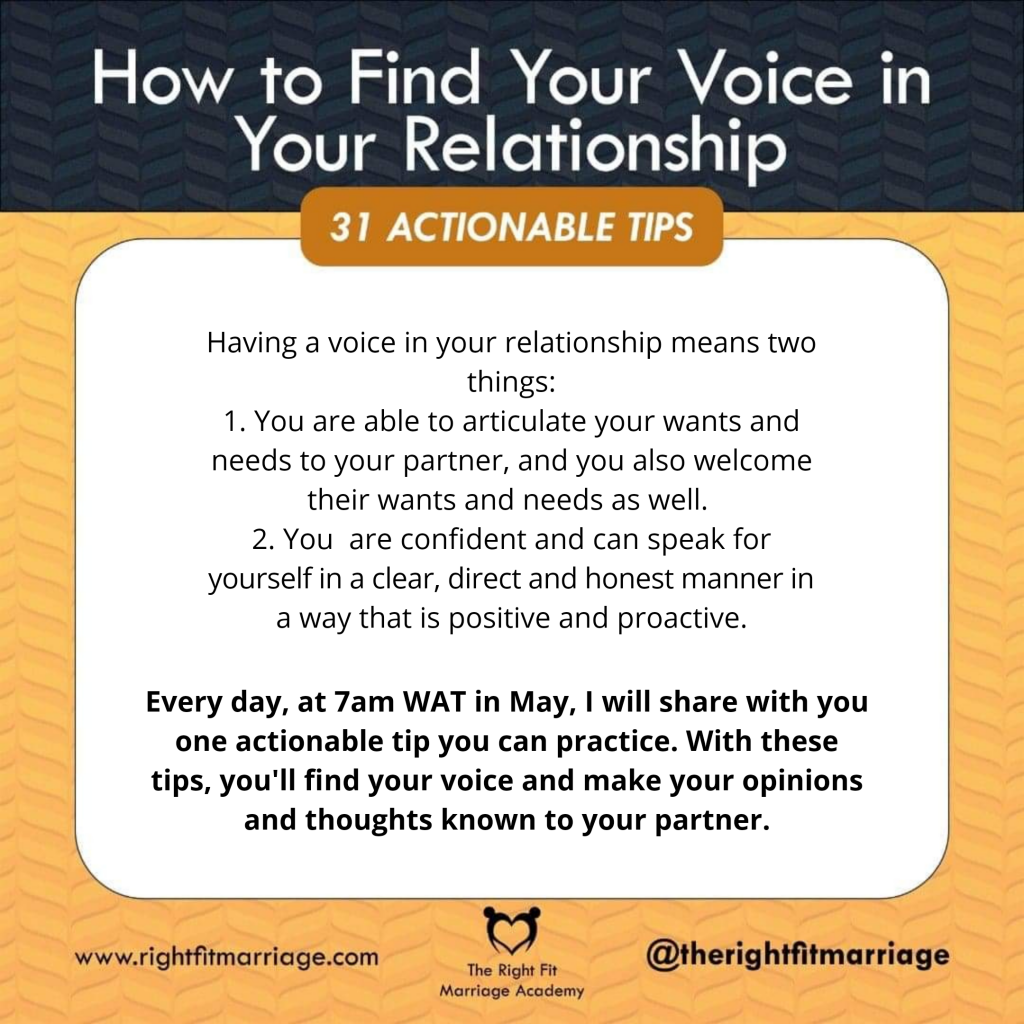
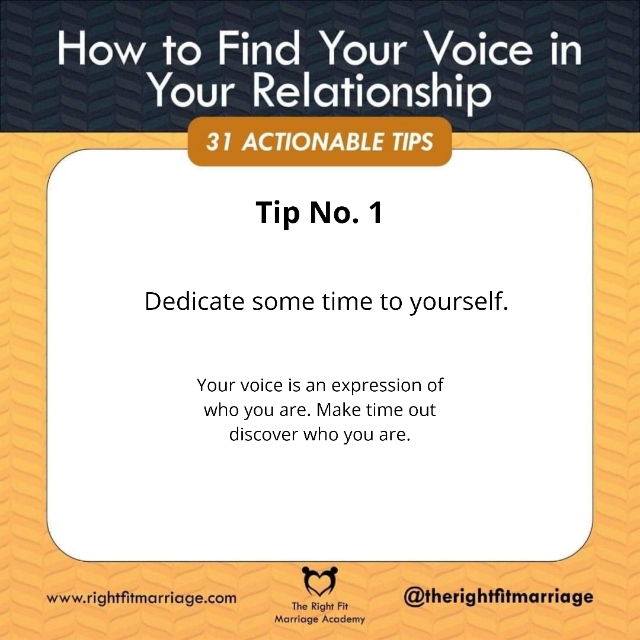
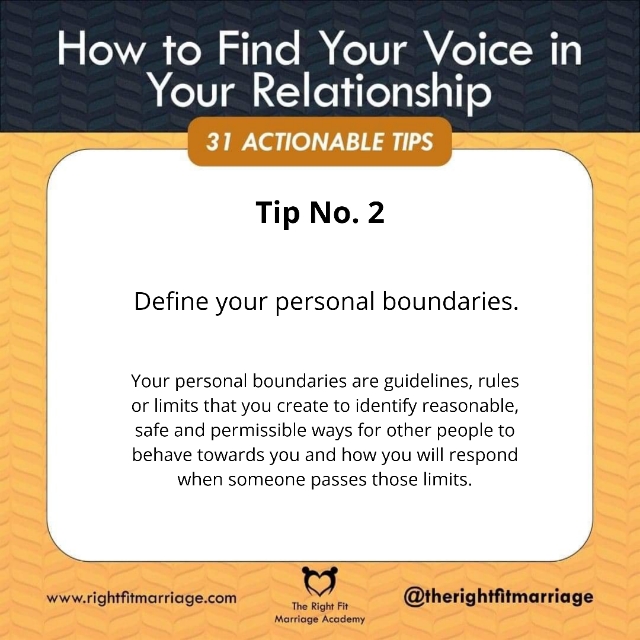
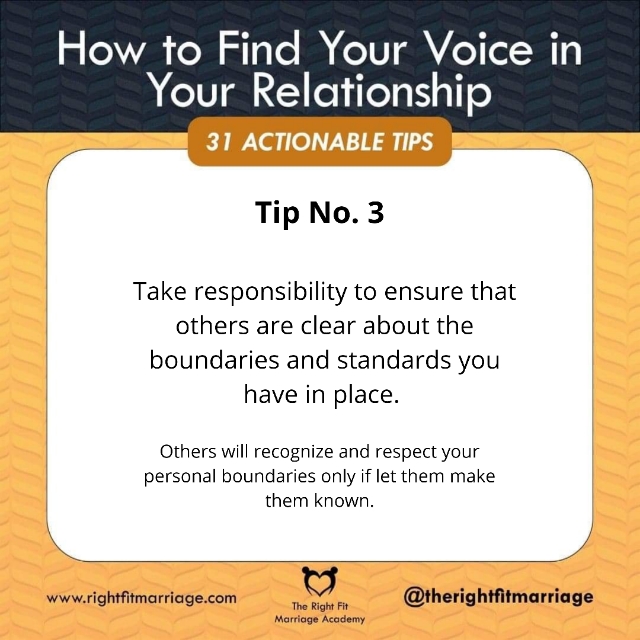
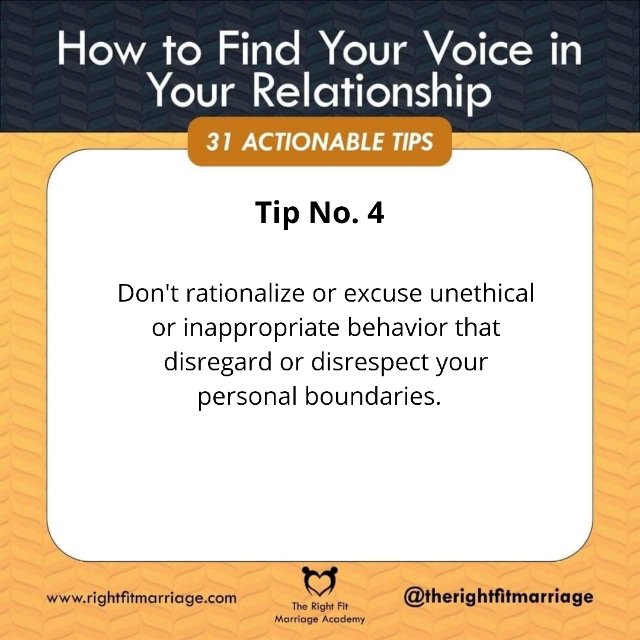
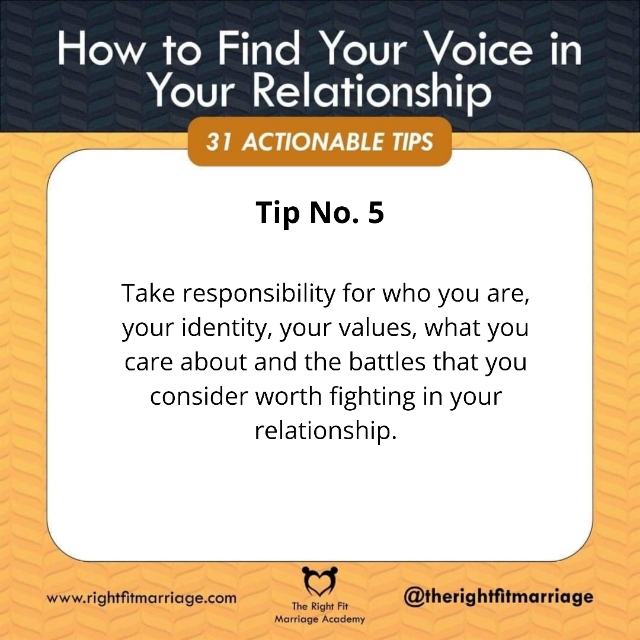
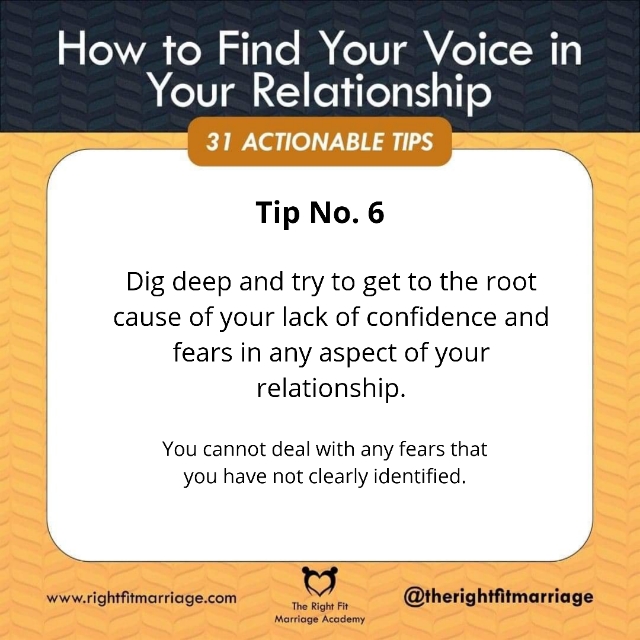
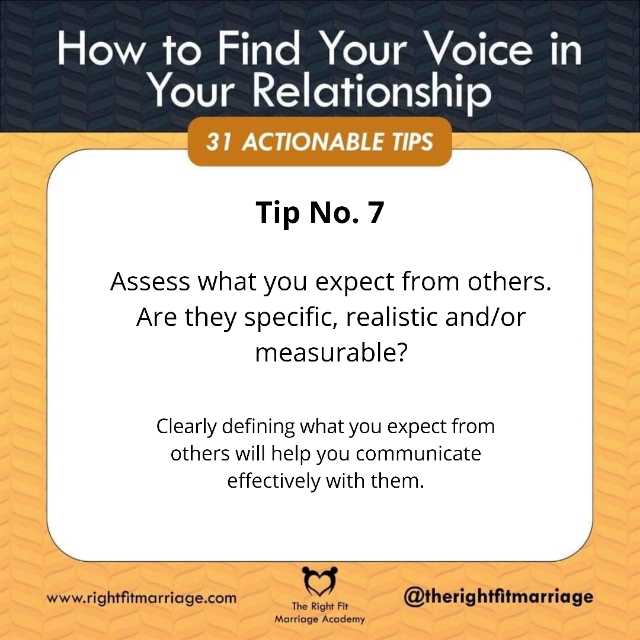

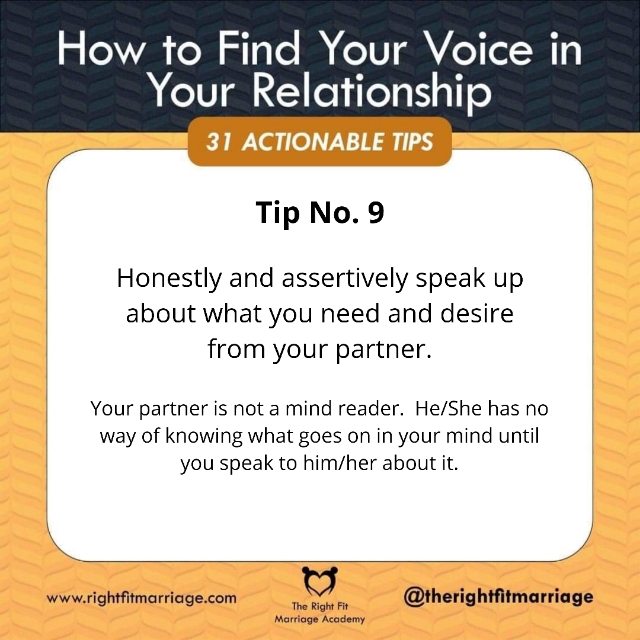
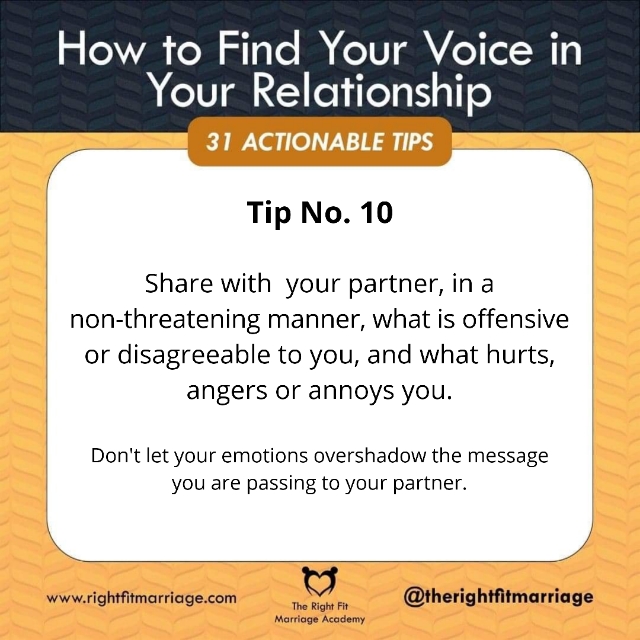
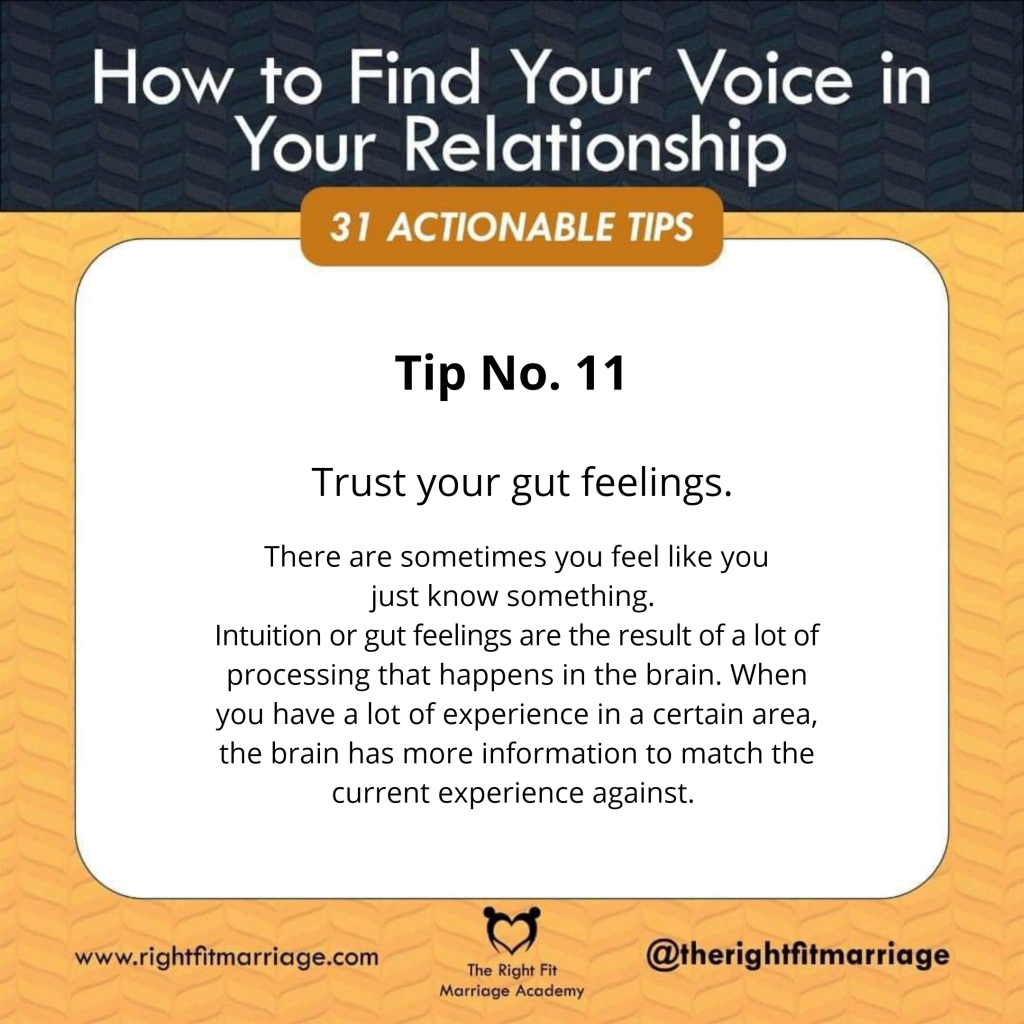
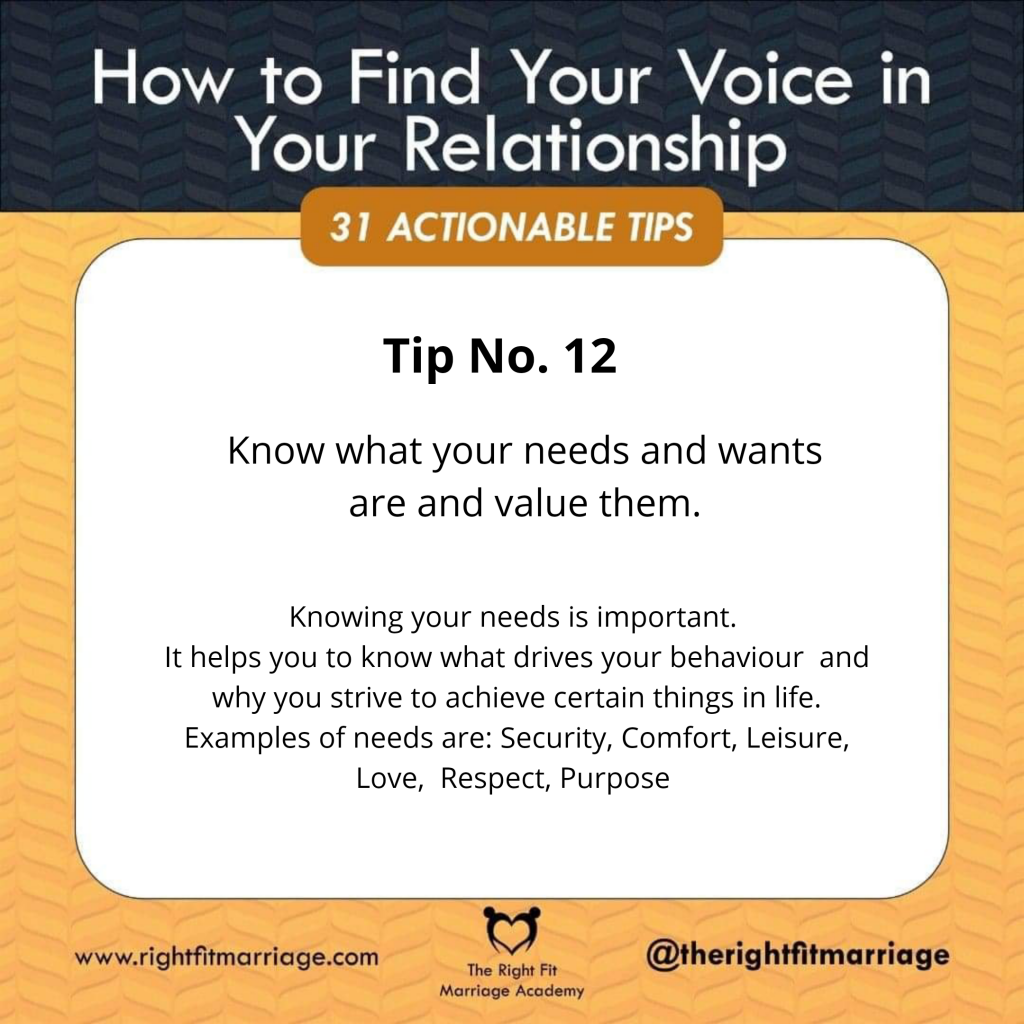
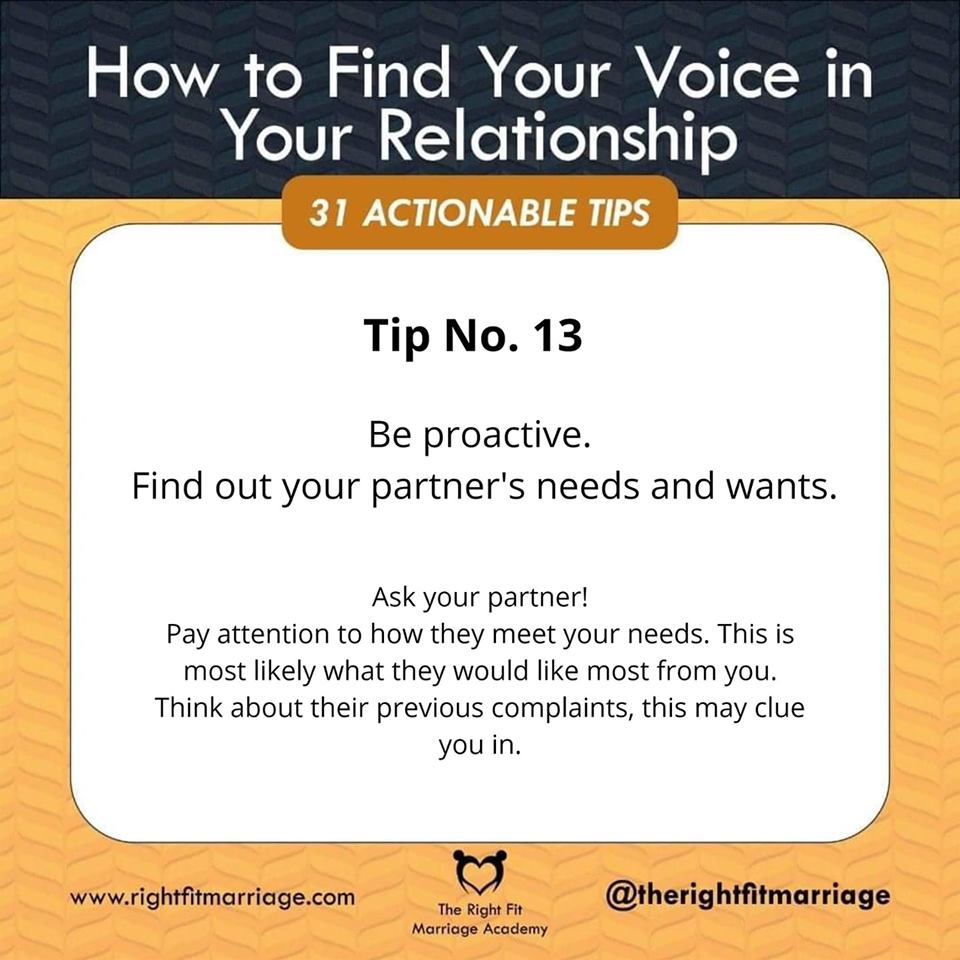

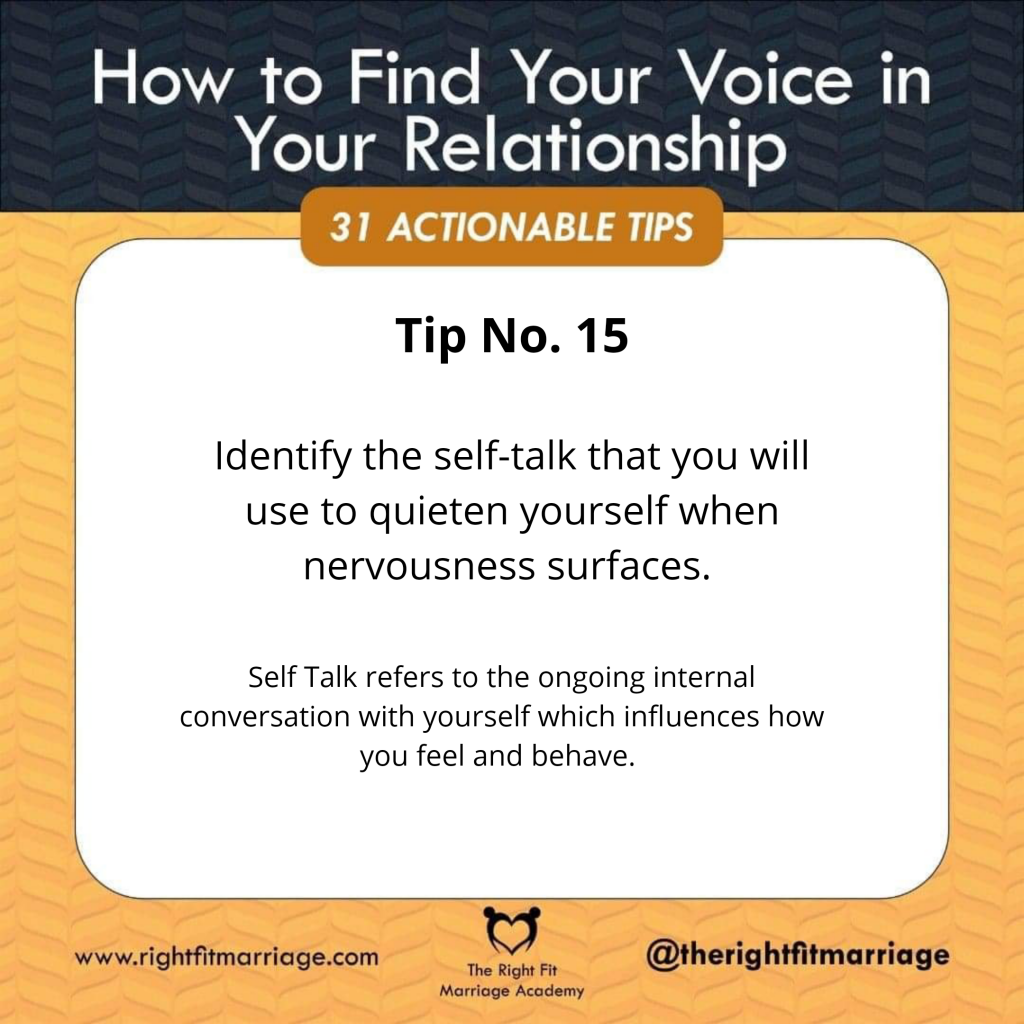
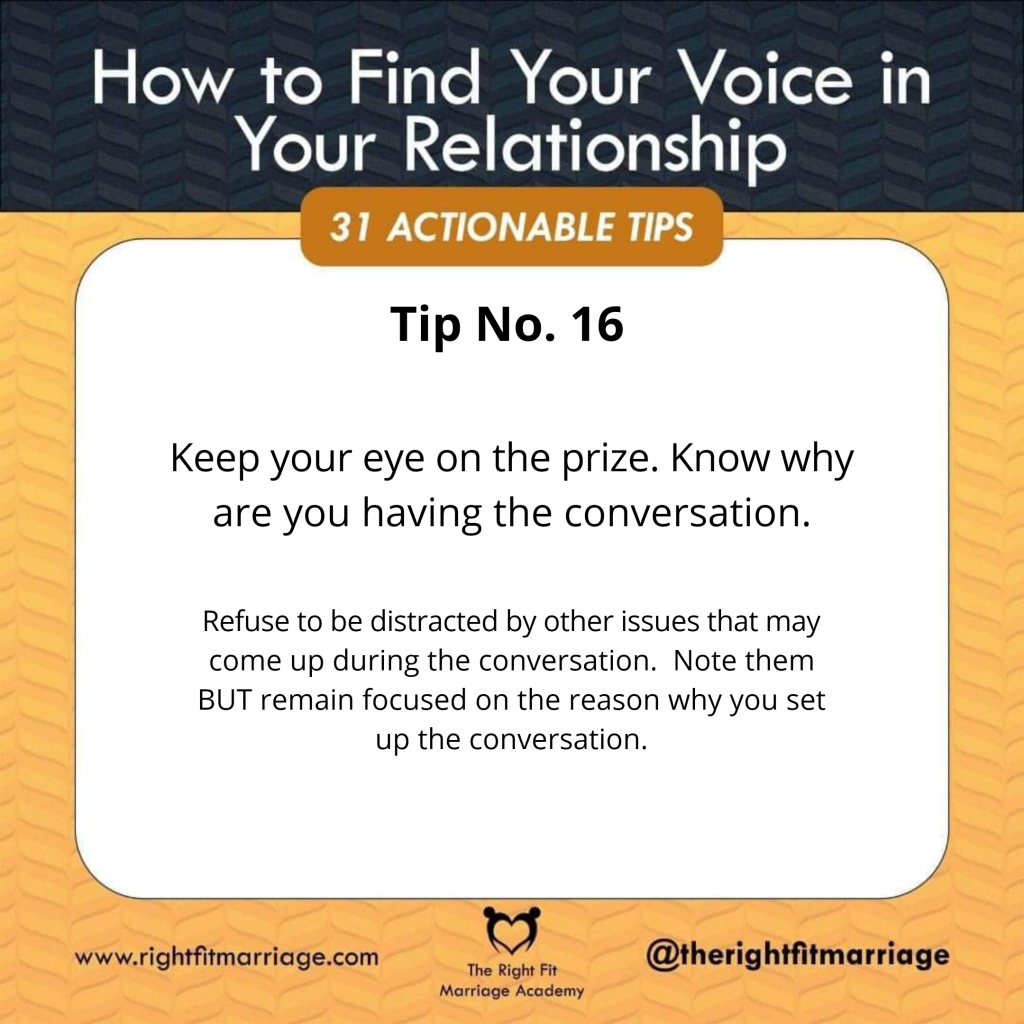
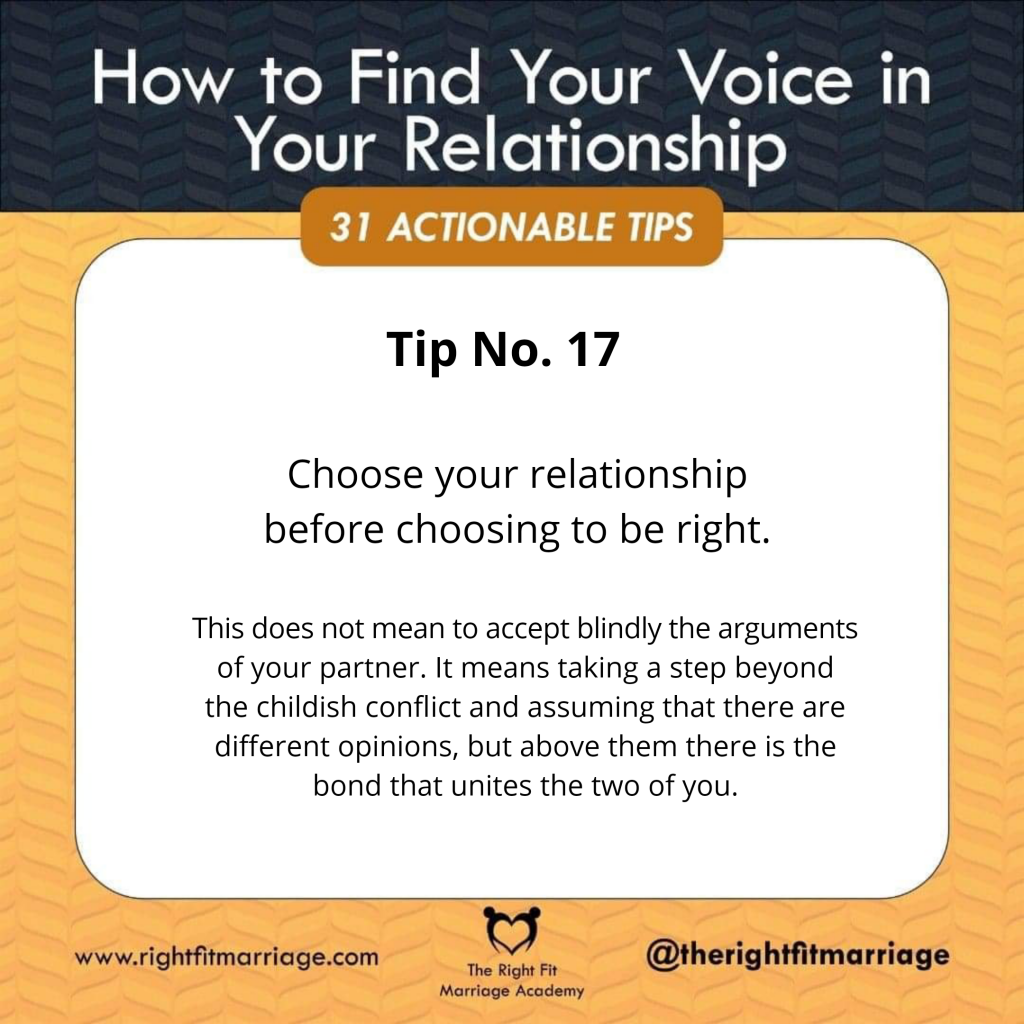
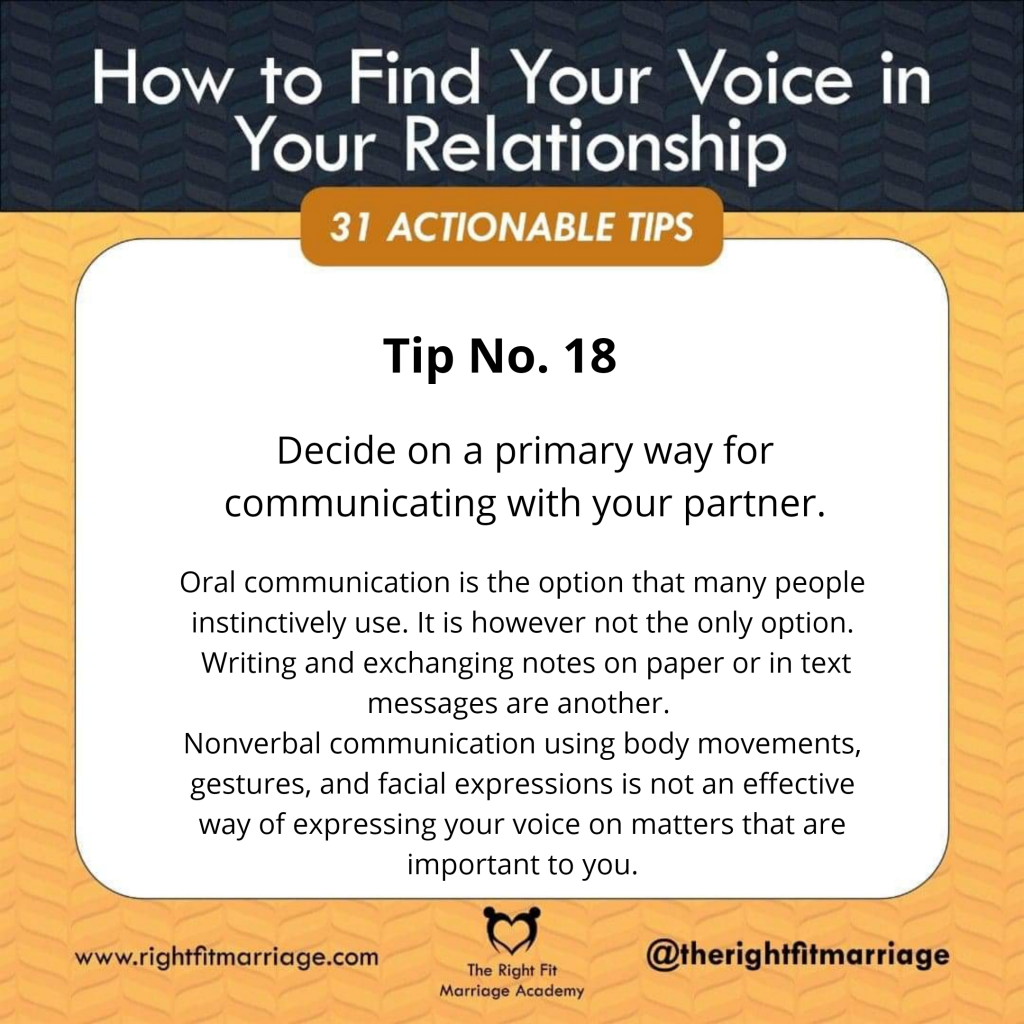
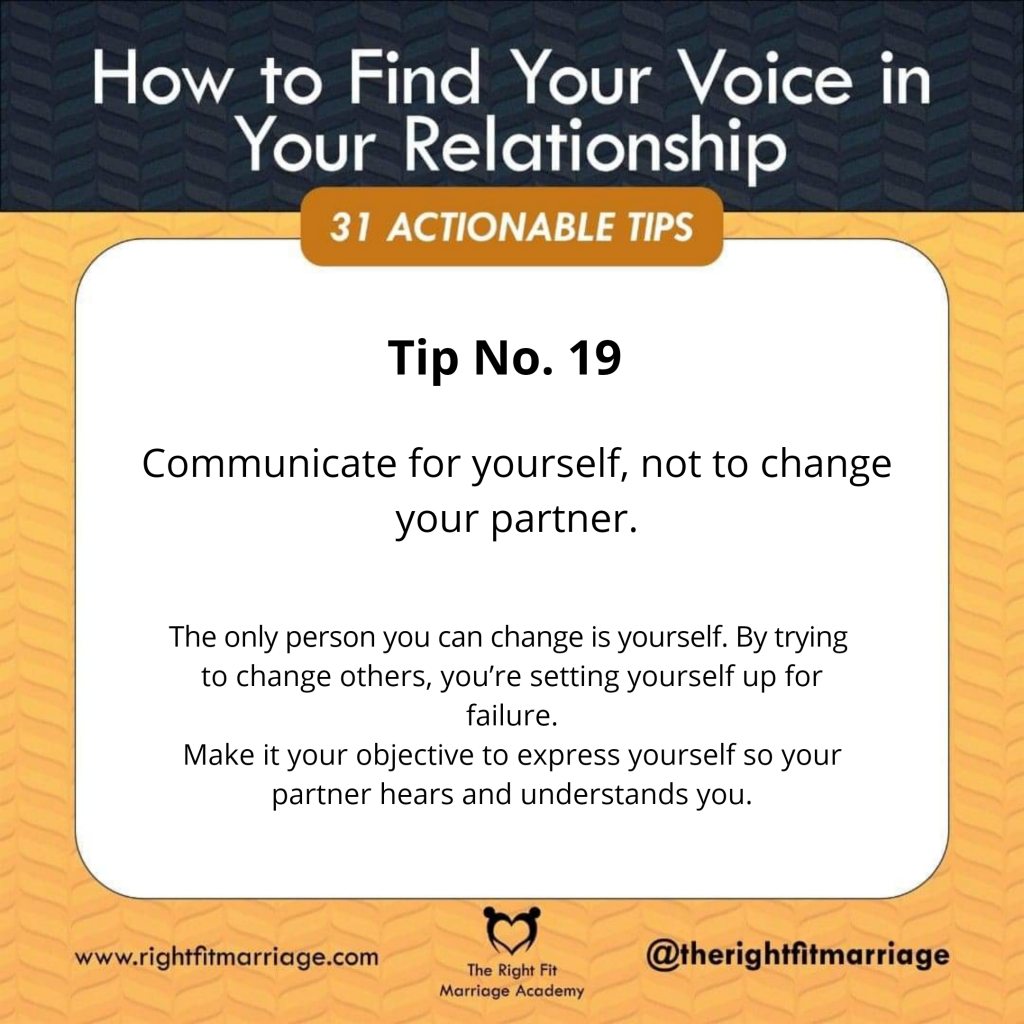
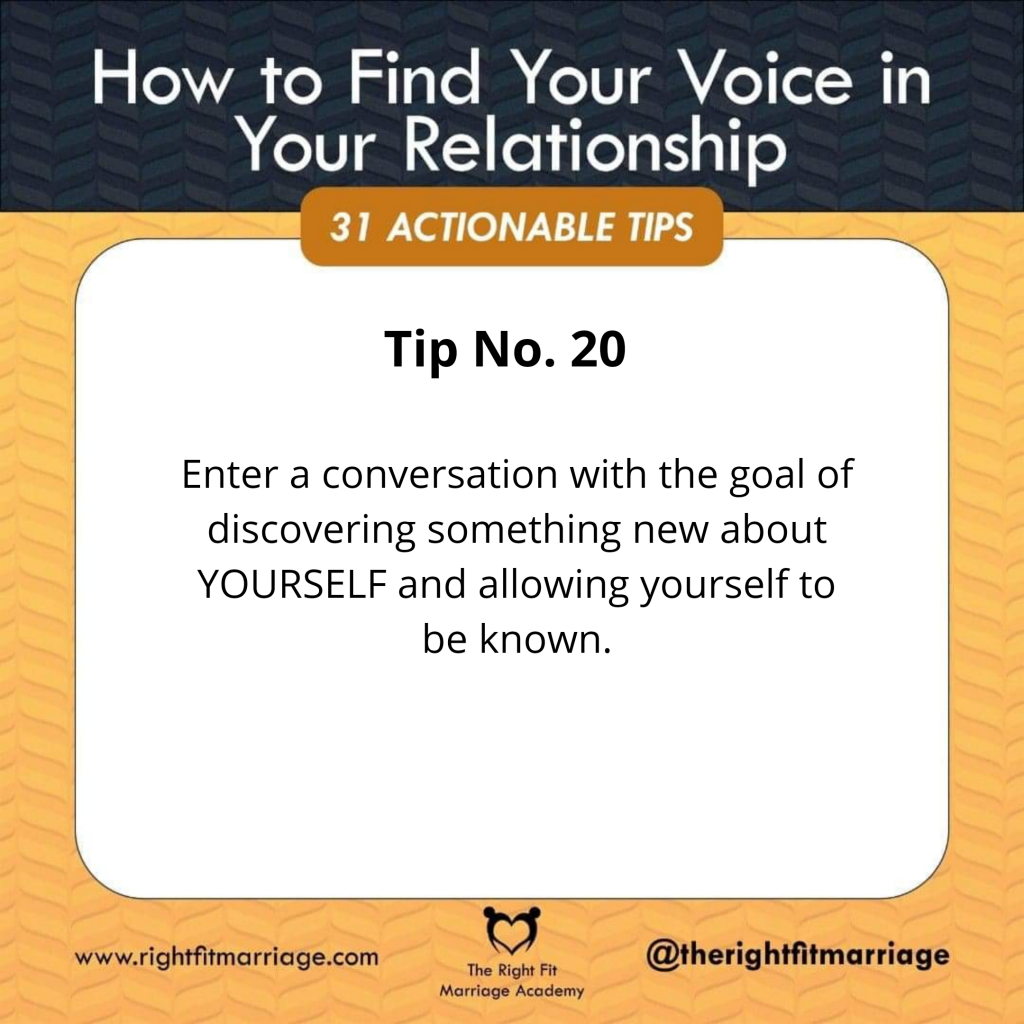
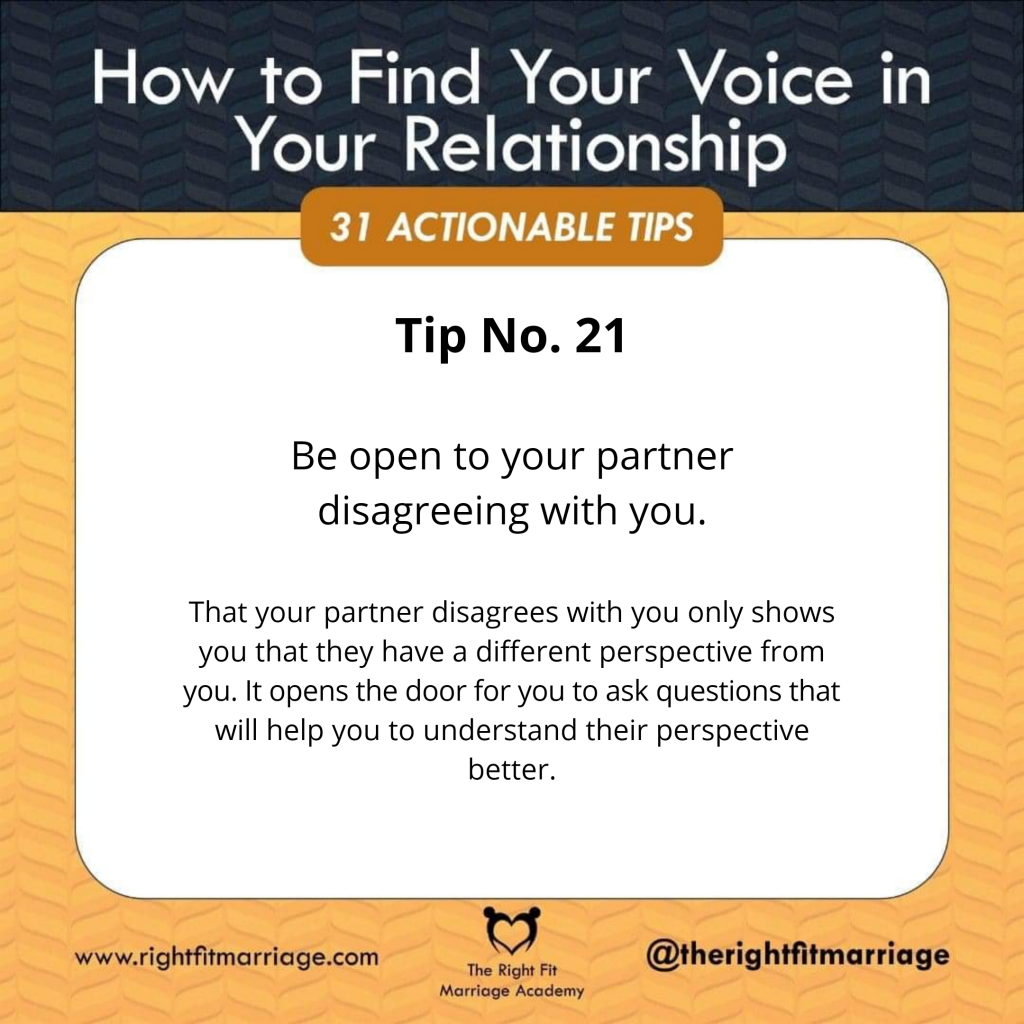
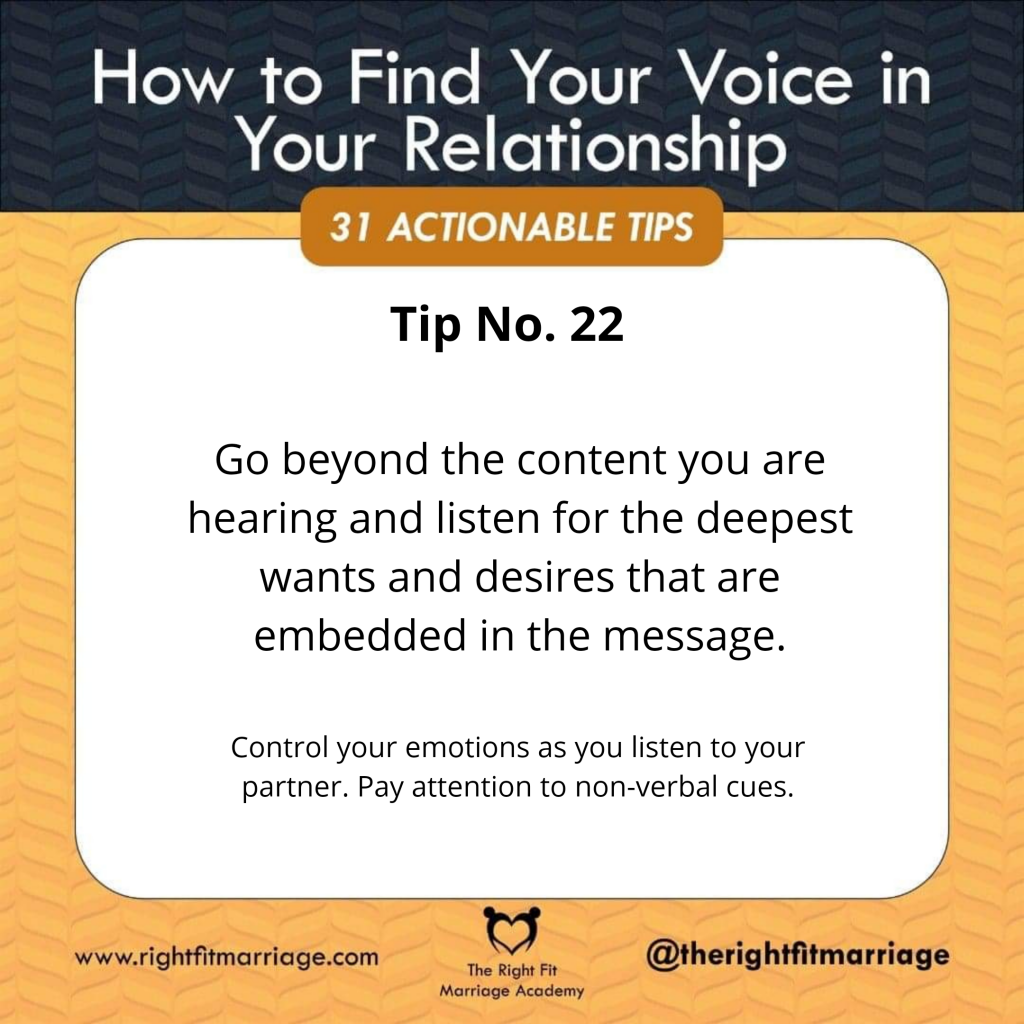
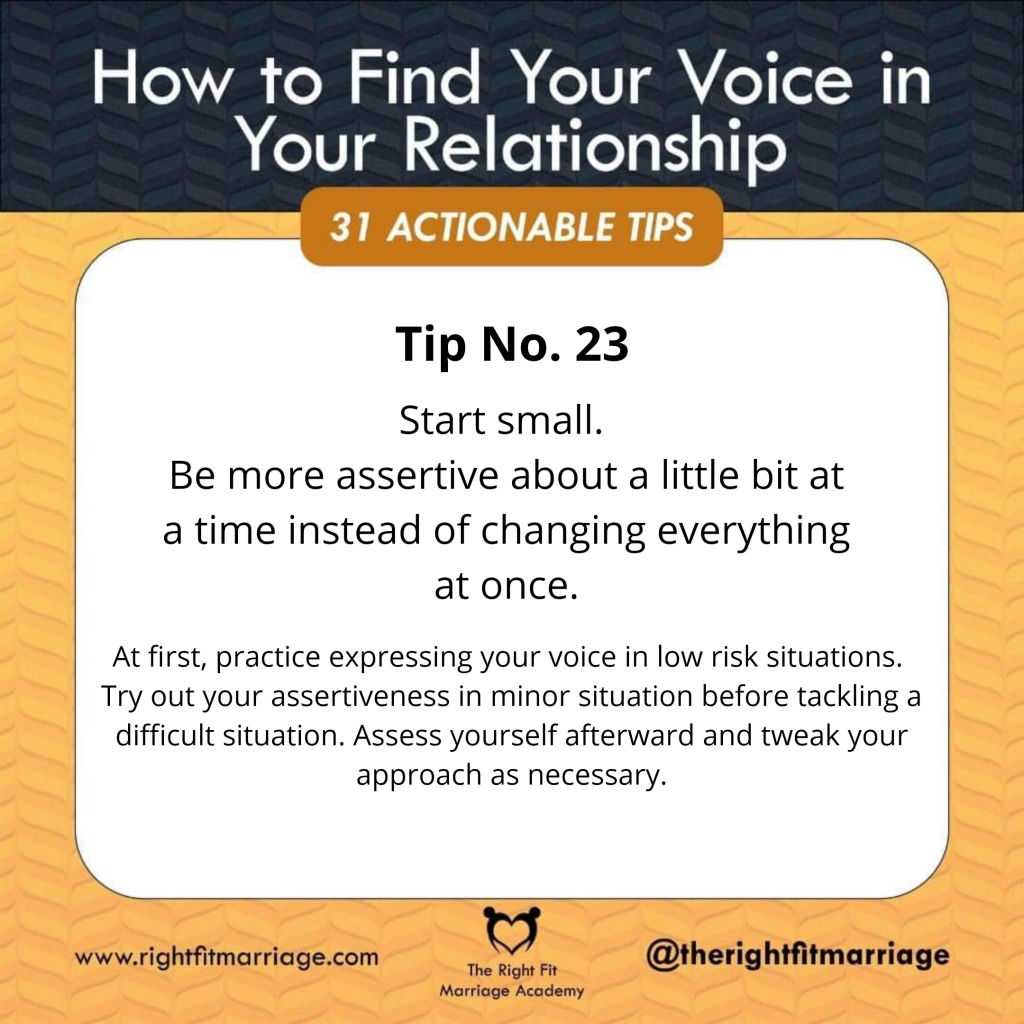
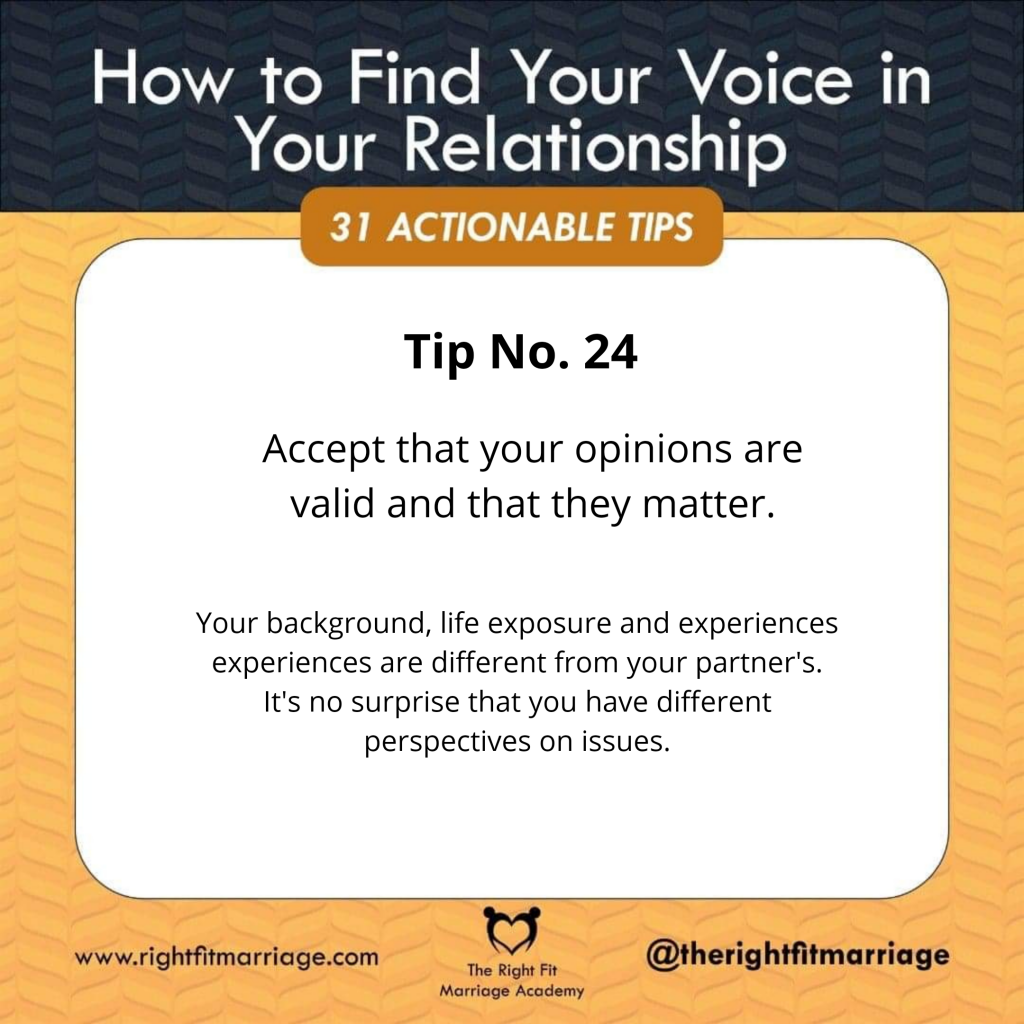
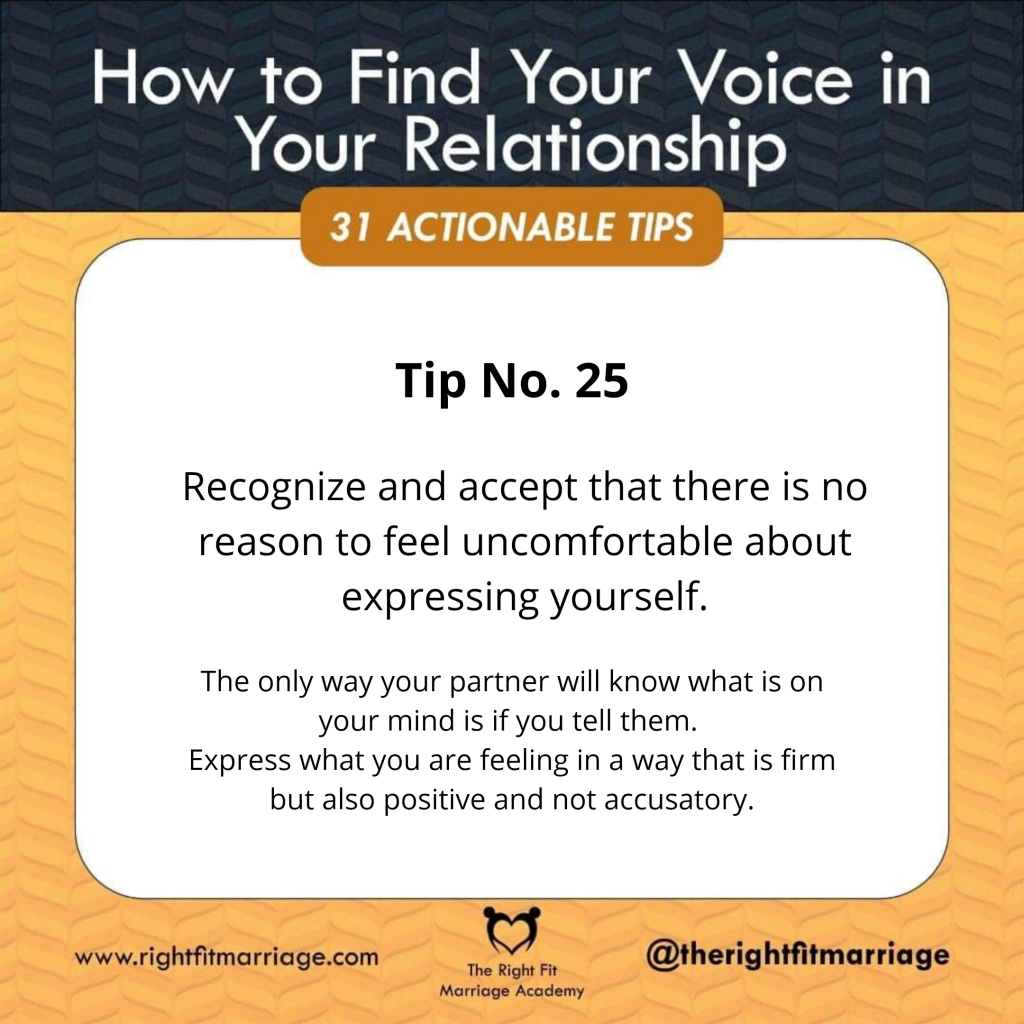
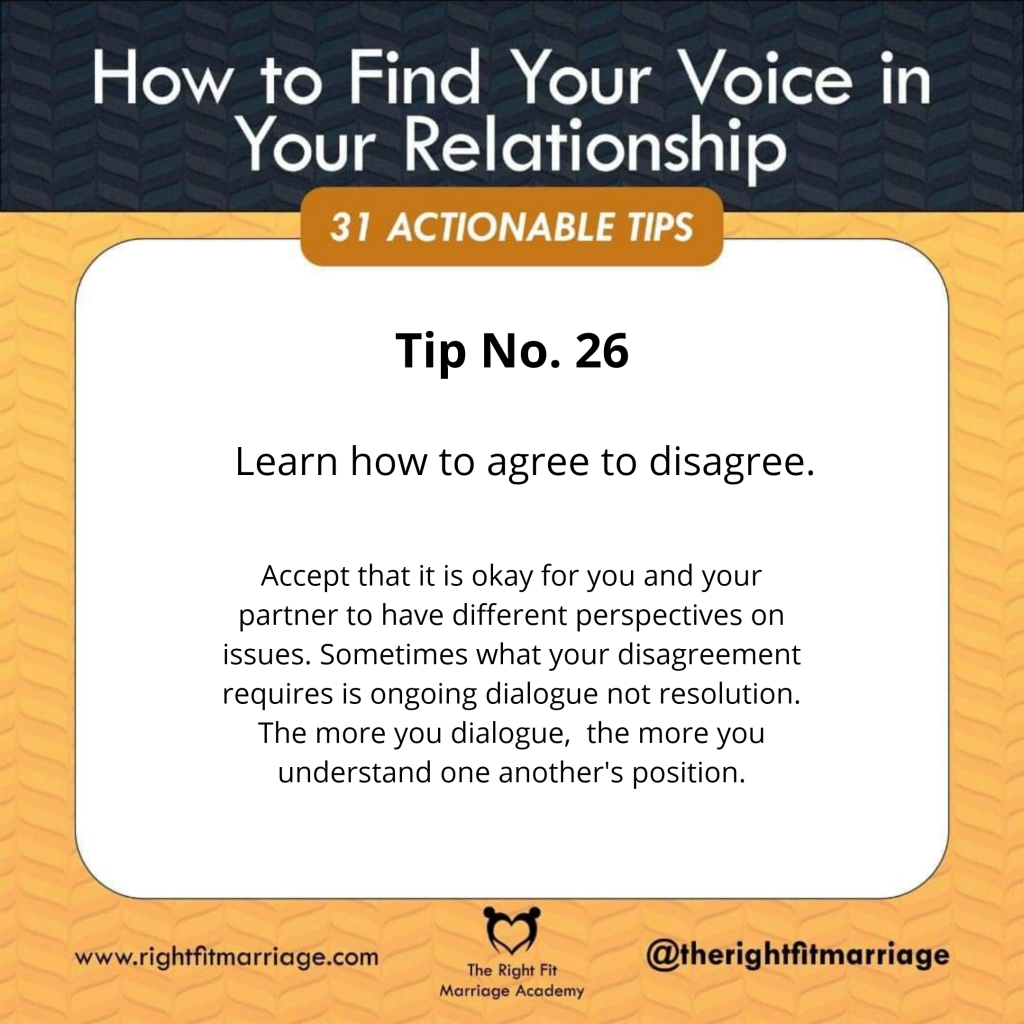
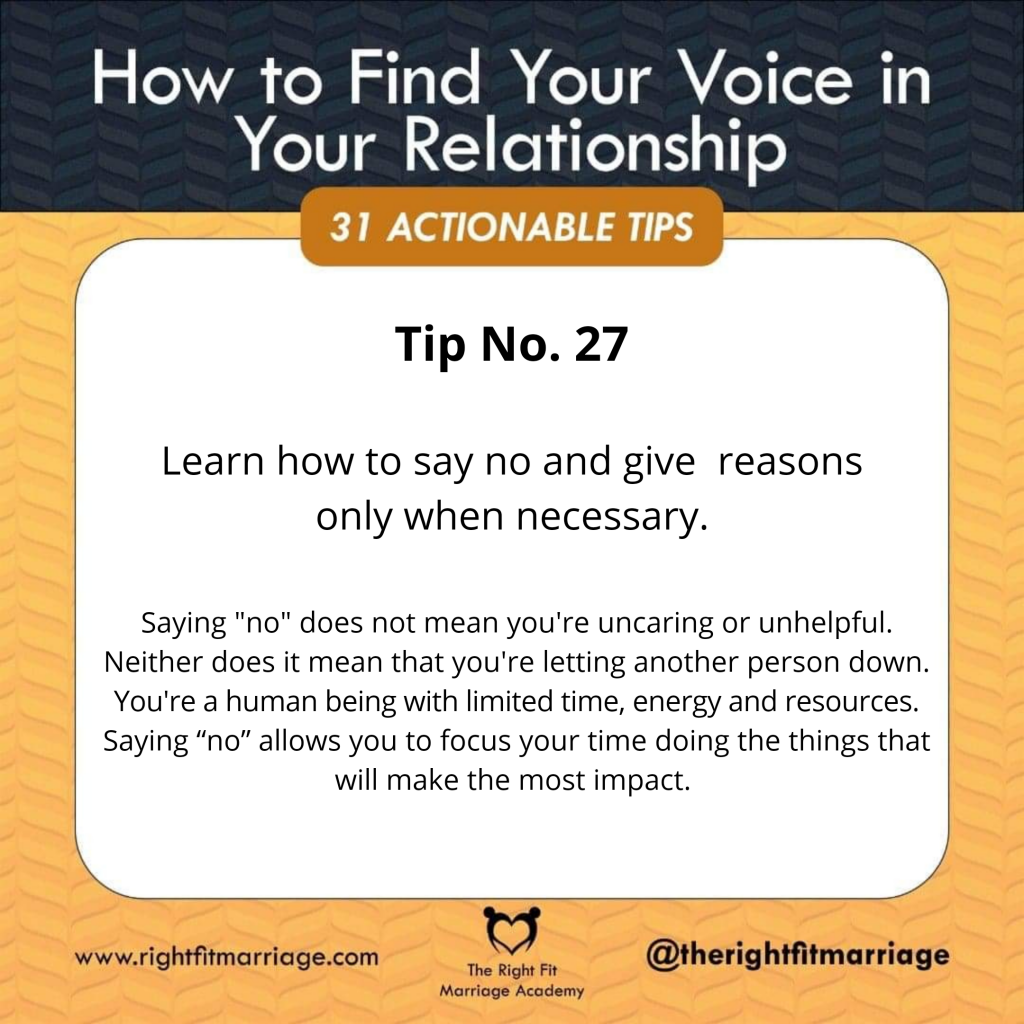
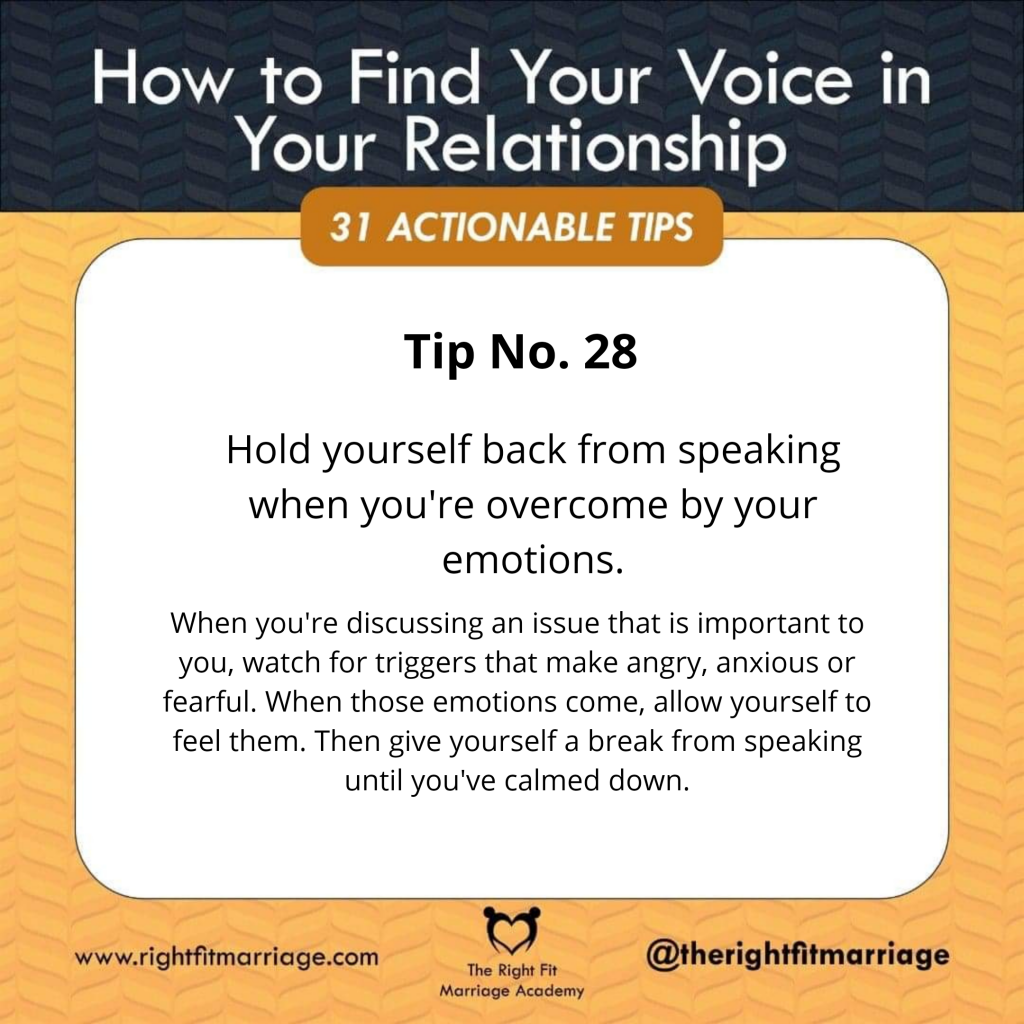
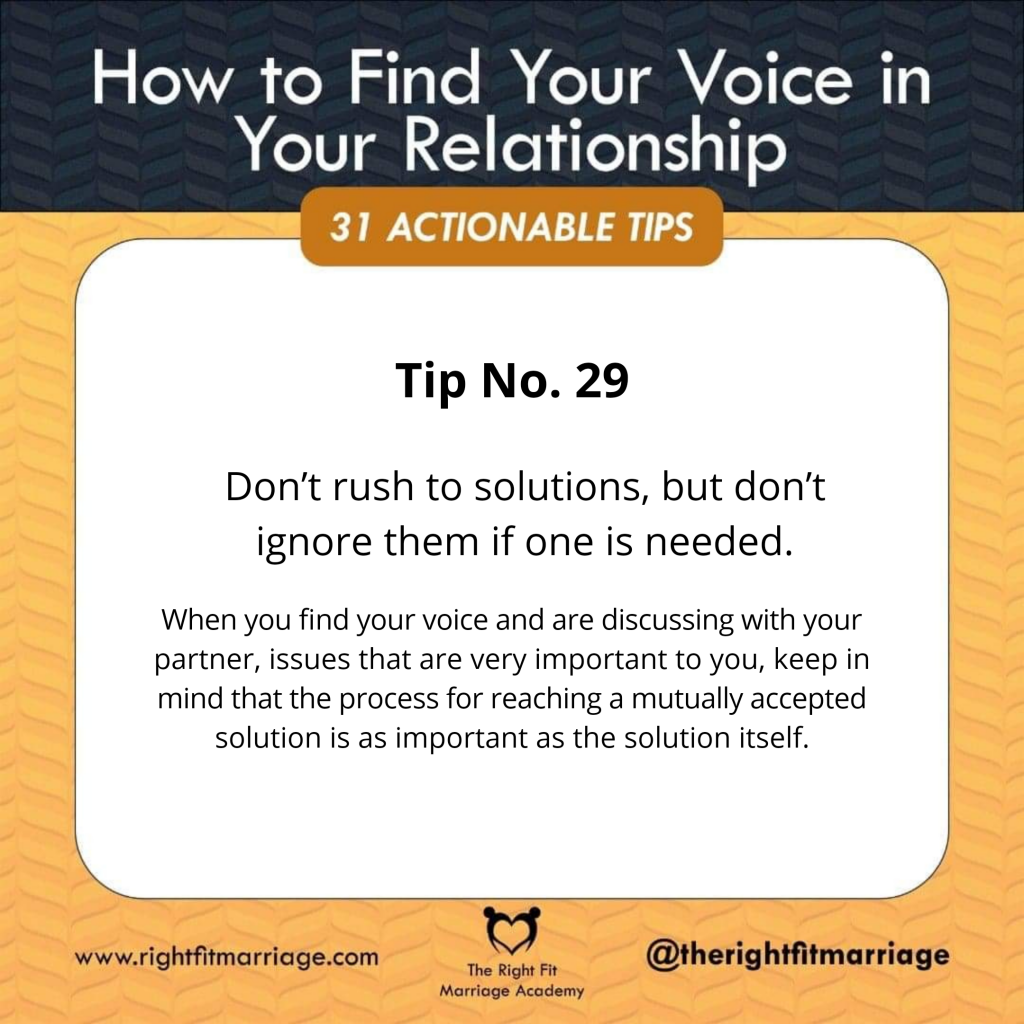
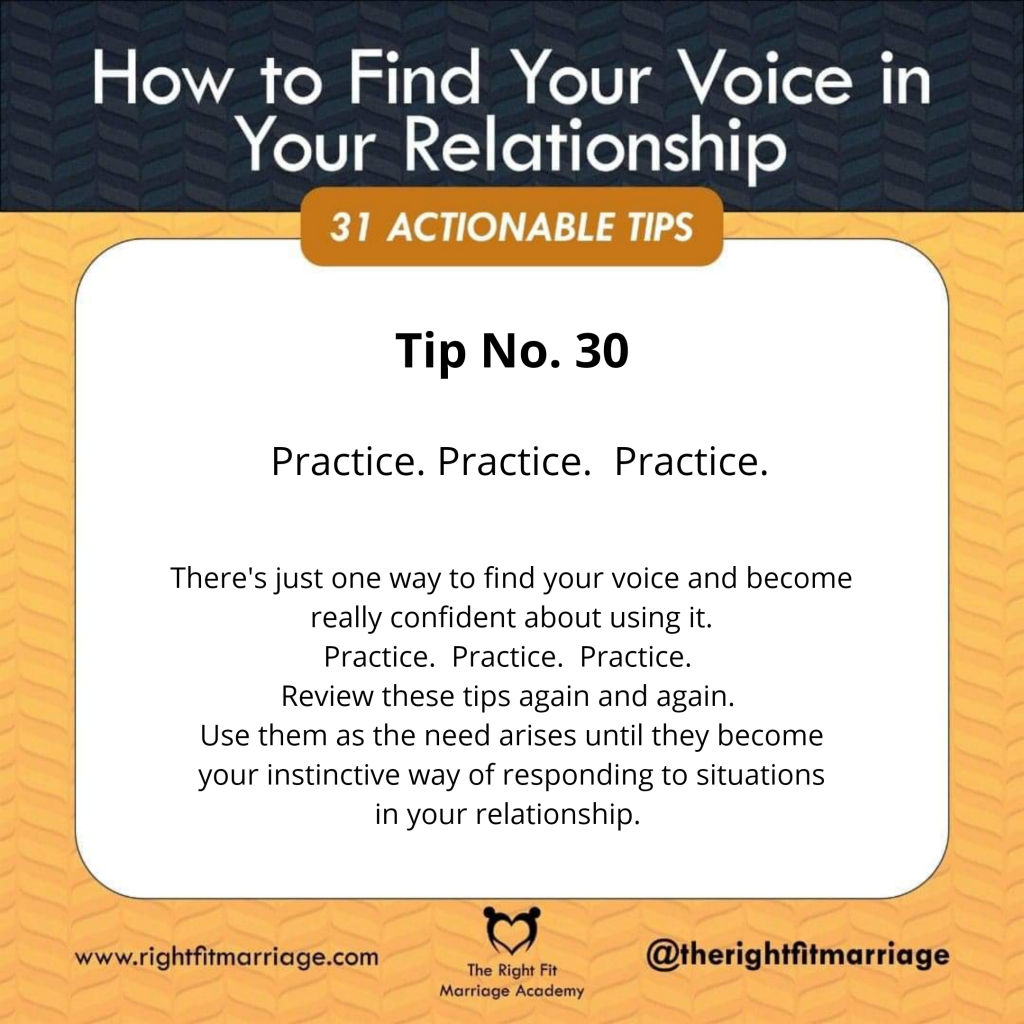
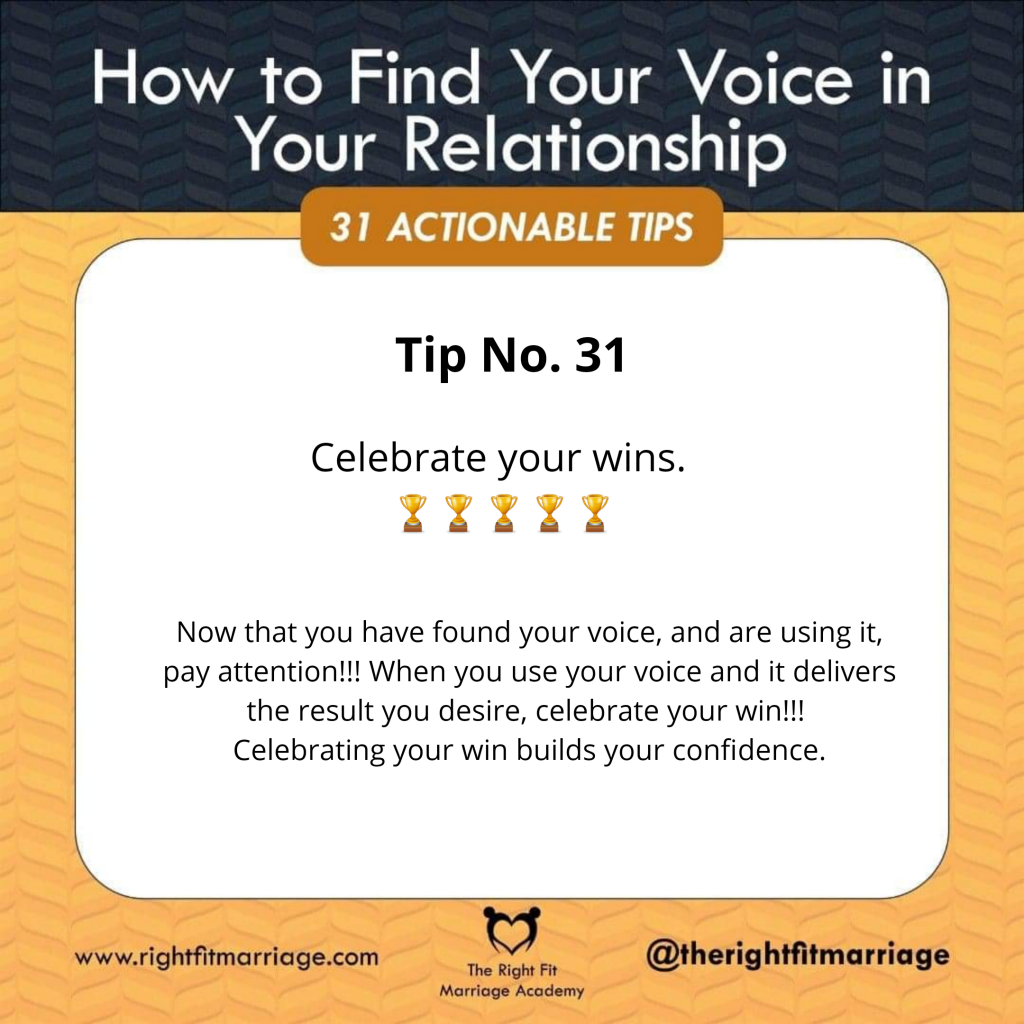



No Comments